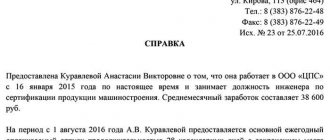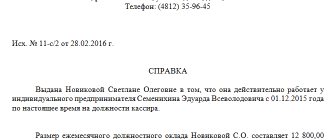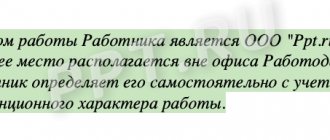Dismissal is the end of the employment relationship between the subjects of contractual relations: the employer and the employee of the enterprise (organization), individual entrepreneur. The grounds and guarantees arising in the process of dismissal from work are determined by labor standards, in particular, the Labor Code of the Russian Federation. The reasons for dismissal from work are recognized as complying with the law if they meet the following criteria:
- the person is dismissed for legal reasons, with actual circumstances;
- compliance with the employee dismissal mechanism;
- termination of labor relations for a period of time.
If these conditions are met, the reasons for the citizen’s dismissal comply with the rules of law.
When the employment relationship ends
The reasons for dismissal from work under the Labor Code are enshrined in the articles of this law. In particular, they are the following reasons:
- An agreement (agreement) between the subjects of legal relations.
- Expiration of the agreement.
- Termination of the agreement on the initiative of the employer.
- Transfer of an employee with his consent to another employer.
- Refusal of an employee to work due to a change in ownership of property, in connection with reorganization procedures in the company.
- An employee’s refusal to work due to changes that are not specified in the contract.
- Refusal of an employee to be transferred to another type of work due to his state of health, confirmed by the conclusion of specialists.
- Refusal of an employee to be transferred to another region.
- Circumstances that occurred due to force majeure.
- Violation of the provisions of the Labor Code if they exclude the possibility of continuing work activity.
Can I be fired during a probationary period?
The legal basis is the mention in the employment contract of the need to undergo a test. You need to specify its duration. It is unacceptable for a person to be told that an employment agreement will be concluded if he successfully completes it, then this is illegal. Whether someone can be fired during a probationary period depends on whether the new employee can cope with the job.
The procedure follows the following rules:
- Three days before dismissal, the employee is warned. The day of dismissal must be included in the probationary period. Thus, it is impossible to suddenly dismiss on the last day, due to lack of prior notice.
- Reasonable reasons are given as to why the employee did not approach. This must be stated in writing.
If in doubt, an employee can apply to the court to protect his rights.
When an employer has the right to separate employees
Note that the reasons for dismissal from work at the initiative of the employer are varied, for example:
- liquidation measures at the enterprise or closure of the work of individual entrepreneurs;
- staff reduction.
But what guarantees are provided to the population in these cases? Here are some examples:
- Part 1 of Article 180 of the Labor Code of the Russian Federation guarantees that an employer, in the event of liquidation, reduction of staff or numbers, is obliged to offer an employee a vacant position.
- When staffing is reduced, the employee must be paid severance pay in the amount of average earnings, wages and the monetary value of unused vacation. At the same time, wages are due according to the average for the entire period of employment. This is the time when a person is looking for a job and is registered with the labor exchange, but, in general, no more than two months.
The procedure for selecting employees for dismissal during layoffs
The employer has the right in the internal documentation of the enterprise to indicate the category of persons enjoying preferential rights in case of layoffs. Managers strive to retain qualified personnel whose work results are distinguished by high marks.
When reducing staff, the employer must clearly plan the contingent of employees with whom the employment contract can be terminated without consequences. When selecting personnel for continued cooperation, it is necessary to be guided by the norms of labor legislation. Persons who support two or more dependents, as well as employees who are the only breadwinners in the family or employees who have been injured as a result of a work-related injury or occupational disease have a priority right to remain at work. The regulations prohibit the dismissal of inventors, post-war service workers and military spouses.
Employer initiative
Here are the most common reasons for dismissing an employee at the initiative of the employer:
- the employee’s inadequacy for the position held;
- failure to fulfill the employee’s job duties without valid reasons;
- severe violation of labor duties by an employee (failure to appear at work for more than 3 hours, theft, coming in drunk, non-compliance with labor protection provisions, intentional actions by an employee, an immoral act committed by a teacher, etc.);
- providing the employer with false documents when applying for a job;
- other cases.
Registration for regular violations
The basis for dismissal may be repeated misconduct by the employee (Article 81 of the Labor Code of the Russian Federation). The following are examples of cases in which dismissal may occur under the article:
- Absence from work for an unexcused reason.
- Refusal to undergo a medical examination if it is mandatory.
- When the norm changes, if the employee does not want to do his job because of this (Article 162).
- Refusal to take a safety exam if this is a condition of admission to work.
To dismiss under the article, a disciplinary sanction is announced for the offense committed. Recording of new violations in accordance with the provisions of Article 193 of the Labor Code of the Russian Federation. A dismissal order is issued.
Typically, a disciplinary sanction is lifted after a year. Thus, two offenses within a year are enough for dismissal.
Employee initiative
The most peaceful way to end an employment relationship is the employee’s initiative to leave work. The reasons for voluntary dismissal may be related to the citizen’s professional activities or personal reasons. The employer specifies Article 77, 1, clause 3 as the basis for dismissal - at his own request. The reasons for leaving a job voluntarily may also be related to other circumstances in the employee’s life. Usually, the employer has the right not to let the employee go without working for 2 weeks. Are there any reasons for dismissal without working through the Labor Code of the Russian Federation? Yes, an employee can be fired without working if there are good reasons for this. In other situations, he is required to work at the enterprise for 2 weeks so that the employer can find a replacement for him. Thus, the reasons for voluntary dismissal without work in all cases can only be valid.
Can a pregnant woman be fired during a probationary period?
The grounds for dismissing a woman who is expecting a child are listed in Article 261 of the Labor Code of the Russian Federation. No other reasons for this are possible. Regarding being on a probationary period, it must be taken into account that an employee who is expecting a child cannot work on a probationary period, since she is prohibited from establishing it by Article 207 of the Labor Code of the Russian Federation.
If, despite the prohibition, the manager indicated a condition for a probationary period in the employment contract, then it will not have legal force, since it constitutes a violation of the law. Even if the boss has complaints against the employee, such dismissal on his initiative cannot happen. When asked whether a pregnant woman can be fired during a probationary period, there can only be a negative answer.
Wrongful dismissals
Fired from your job without reason? What to do? Indeed, not all employers comply with the law; there are many cases of wrongful dismissals. For such cases, there is a clear algorithm of actions for the citizen.
Can they be fired without reason? No, the Labor Code of the Russian Federation prohibits dismissal without reasons. The Labor Code of the Russian Federation has a clear list of grounds for dismissal - Article 77 of the Labor Code of the Russian Federation.
When fired without reason, it is necessary to protect labor rights. To protect rights, a labor inspectorate, prosecutor's office and court have been created. All these bodies are competent to consider issues of illegal dismissal of citizens from work. In order to contact the labor inspectorate, you must file a complaint. Its structure is indicated on the website: you need to fill out the fields of the complaint and send it online to the labor inspectorate. Source: HR Blog
Read also
05.07.2017
Can an employee of pre-retirement age be fired?
The pension reform law, which came into force in 2021, introduced the concept of pre-retirement age. It begins 5 years before a person receives the right to retire and lasts until the beginning of retirement age. According to this normative act, the age at which the right to a pension arose gradually began to increase.
Previously, it was 60 for men and 55 for women. Now it gradually increases depending on the year of birth, until it reaches 65 years for men, 60 for women. For a particular person, the pre-retirement age is determined in accordance with his time of reaching retirement age.
It should be borne in mind that the age indicated here is the retirement age for most citizens, but not for all. There are categories of workers for whom the possibility of earlier exit is provided. For example, this applies to workers in hazardous and hazardous industries, residents of the Far North and some others. For each such person, pre-retirement age occurs 5 years before his retirement.
Due to the fact that they now retire later for a well-deserved rest, such people have become less socially protected. In this regard, the state has provided measures for their social protection. In advancing years, the threat of dismissal or refusal to hire is more likely than before.
For dismissal or refusal to hire due to old age, the employer will bear administrative or criminal liability. Can an employee of pre-retirement age be fired for other reasons - yes, on a general basis. Such people are protected from age-related abuses, but the law does not prohibit them from being fired.
How are grounds and causes classified?
To terminate an employment contract there must be at least one of the legal grounds, which can be classified as:
- basic;
- additional;
- due to current circumstances;
- legally justified.
1. In Art. 77 of the Labor Code of the Russian Federation provides a list of general grounds when an employment contract ceases to be valid:
- Based on the agreement and agreement reached between the owner and the hired worker (Article 78 of the Labor Code of the Russian Federation).
- Upon expiration of the contract or the scope of work provided for by its terms has been completed (Article 79 of the Labor Code of the Russian Federation).
- When an employee no longer wants, or due to current circumstances cannot continue to work in this organization and wants to resign of his own free will (Article 80 of the Labor Code of the Russian Federation).
- The employer does not want to continue to have any joint production relations with the employee in the future due to loss of trust or failure to fully fulfill official duties, violations of labor discipline, and other situations permissible in accordance with Art. 81 Labor Code of the Russian Federation.
- In the event that, under a written guarantee of employment from another employer, a person is transferred to another organization or may be elected to an elective position.
- If the employee is not satisfied with the new owner of the enterprise or changes in jurisdiction that occurred in connection with the reorganization, the transition of a state institution to a municipal type (Article 75 of the Labor Code of the Russian Federation).
- If the employee does not agree to accept the changes made by the employer to the terms of the employment contract and refuses to continue working, fulfilling the new requirements (Part 4 of Article 74 of the Labor Code of the Russian Federation).
- If the employee does not want to transfer to a vacant position offered by the manager, where the working conditions are compatible with his state of health and medical report.
This may include cases when the employer does not have suitable workplaces where the employee can continue to work if medical indications do not allow him to perform previous duties (transfer to light work, according to Part 3 and Part 4 of Article 73 of the Labor Code of the Russian Federation);
- Change by the owner of the legal and actual address of the location of the enterprise and the employee’s refusal to move from his main place of residence in order to be able to continue working in his specialty for the previous owner (Part 1 of Article 72.1 of the Labor Code of the Russian Federation);
- Circumstances that do not depend on the wishes of either party to the contractual relationship (Article 83 of the Labor Code of the Russian Federation);
- When the contract is concluded in violation of the rules established by labor legislation or other federal laws, which excludes the possibility of continuing to work further (Article 84 of the Labor Code of the Russian Federation).
2. Additional reasons when an employment contract may be terminated are also defined in the Labor Code of the Russian Federation, these include:
- removal from his position of the head of an enterprise that is in the process of bankruptcy (Article 278 of the Labor Code of the Russian Federation);
- termination of contractual relations providing for combination of professions when hiring a person for a combined position for permanent work;
- For teachers involved in the upbringing and education of the younger generation, the following is fraught with dismissal: repeated violation of the charter of an educational institution;
- even a single use of unacceptable methods of education with the use of violence against a student of a physical or psychological nature;
- reaching the age when, according to Art. 332 of the Labor Code of the Russian Federation, certain positions cannot be filled;
- in the event of an emergency in the host country (the outbreak of hostilities, natural disasters, etc.);
- in case of disqualification for more than six months;
This is also important to know:
Can a pregnant woman be fired from work: reasons for dismissal according to the Labor Code of the Russian Federation
Special requirements for compliance with the charter or regulations on discipline for civil servants, accordingly, expand the grounds giving the right to terminate the employment relationship if they are not fulfilled.
3. The legal grounds for termination of an employment contract are listed in Art. 83 of the Labor Code of the Russian Federation, when the decision to dismiss does not depend on the will of the parties:
- conscription into the Army to fulfill military duty to the Motherland, or for alternative civilian service in special cases determined by law;
- when by a court decision the dismissal of a previously held position in whose place a new employee is hired is declared illegal and the latter is restored to his rights to work;
- if an employee is found guilty of a crime by a court verdict and sent to places of serving the actual sentence, or is excluded from the possibility of further engaging in certain types of activities;
- due to the deterioration of a person’s health, the conclusion of a medical examination indicating complete disability;
- unexpected death of an employee or employer, equivalent to this situation, a court decision declaring an individual dead or missing;
- recognition by the Government of the country or a government body of a constituent entity of the Russian Federation of the onset of emergency situations when it is impossible to continue normal work activity (natural and man-made disasters, accidents, epidemics of viral diseases, the outbreak of hostilities, etc.);
- bringing to administrative responsibility up to and including disqualification of the employee and issuing a decision to remove him from his position for a specified period;
- in case of expiration of a possible two-month period of suspension of special licenses, if it is no longer possible for the employee to perform his job duties (for example, deprivation of a driver’s license, the right to store and carry weapons, etc.);
- in case of a ban on access to state secrets, when fulfillment of the terms of the employment contract is impossible without this permission;
- if a previously adopted court decision on reinstatement at work is canceled upon appeal by the employer;
- in other cases, when circumstances arise that, in accordance with the requirements of labor legislation and federal laws, exclude certain departments and sectors of the national economy from engaging in a certain type of activity.
4. From a legal point of view, termination of an employment contract is regulated by law and must be carried out in compliance with the established rules:
- the validity of the decision to dismiss the employee;
- fulfillment of all procedural requirements;
- documentary evidence of the legal basis for termination of industrial relations.
For immoral behavior
Immoral behavior is grounds for dismissal
According to the latest amendments to the Labor Code, an employee can now be deprived of his job for immoral behavior. True, the corresponding wording in official documents remains very vague, and this article in the Russian Federation successfully applies only to education workers.
Citizens who do not work in educational institutions do not yet face dismissal with such wording. It is important to remember: as in the case of any other violation of labor discipline, before dismissing someone, the employer is obliged to prepare evidence of the employee’s misconduct.
The worker is required to be introduced to the relevant documents and is also given a chance to write an explanatory note and justify himself.
Can they be fired without reason?
Employers are often concerned with the question: Can they fire an unwanted specialist without the employee’s consent? After all, a person is not always satisfied with management, and sometimes the reason is not professionalism, but personal qualities.
If you study the provisions of labor legislation, it becomes clear that there are 3 types of regulatory grounds for termination of a labor agreement (employment contract). The first are related to the employee’s initiative. The second with the will of the employer company. Still others do not depend on anyone, that is, they arise for external reasons. To understand why you can fire an employee, you need to familiarize yourself with the provisions of the statute. 81 TK. This is where it is said how to legally dismiss an employee at the will of the employer.
Dismissal for violation of labor discipline
Dismissal due to liquidation of the enterprise
Liquidation of an organization as a reason for dismissal
Unlike the situation described in the previous section, in the case of liquidation of an enterprise, an employee, as a rule, is powerless to prevent his dismissal. However, the employee has the opportunity to influence circumstances and change them in his favor.
Typically, those enterprises that cease to generate stable income are subject to liquidation. If all employees of an organization, without exception, forget about personal ambitions for a while and begin to invest all their efforts in the development of the company, in the long term this can help the company become more profitable, and dozens of workers keep their jobs.
Appealing dismissal - what options does an employee have?
Under what article they can be fired depends on the following:
- There was a specified reason
- The dismissal procedure took place in compliance with the rules provided for by law
To appeal, you can file a claim in court. If you can prove the illegality of the procedure, you can achieve reinstatement at work, payment of wages and compensation for illegal dismissal.
Conclusion
If a person is going through the redundancy process, they should know their rights and the applicable rules. It is necessary to ensure that everything is done correctly. If necessary, you can appeal the dismissal in court.
Related posts:
- Dismissal due to downsizing at work - what should...
- Vacation followed by dismissal - how to calculate and process
- How sick leave is paid - calculation and examples
- How to calculate maternity benefits for an expectant mother
- Working under a contract without a work book - pros and cons
- Compensation for unused vacation - calculation details
- Flexible schedule - full description, pros and cons
- What is a work book in simple words and why is it needed?
Who is prohibited from being fired by the employer's decision?
Certain categories of workers are protected by labor legislation from forced dismissal:
- employees raising minor children alone;
- pregnant employees, as well as mothers of children under 3 years of age;
- mothers of disabled children;
- employees during periods of incapacity or on vacation. An employer planning dismissal will have to wait until the end of vacation or sick leave.
Employees belonging to the above categories can be dismissed only at their own request or upon liquidation of the organization.
Blog about taxes by Vladimir Turov
Good afternoon friends.
I was once asked a question: “For what can and should you fire an employee, except for direct violations of the Labor Code?”
Let's start with a definition. An employee is a person who collaborates with you, with the manager. His cooperation is aimed at achieving specific company goals. Now let’s highlight the main points that will make me fire a person from the company.
Moment #1. We hire employees to produce some product for the company. The value of the product should be tens of times higher than the wage. Why tens of times? It's simple. Any business has huge expenses: the state takes a large piece of profit in the form of taxes, you need to rent an office, buy property, equipment. Don’t forget to pay for water, for garbage removal, and keep it for yourself. When you look at the entire range of expenses, you understand a simple truth: if an employee brings 1,000 rubles to the company, then we cannot give him the whole thousand. Business is over...
Moment No. 2. We hire employees not to pay them a salary, but to solve the problems and tasks of the company. An employee must make a profit. If this does not happen, he should be fired. And I don’t care what is written about this in the Labor Code.
Moment No. 3. I always adhere to the rule: if an employee produces more every day, works better, then no matter how bad he is, I will protect him. The main thing is that it brings money to the company. In 15 years, I only made an exception to this rule once. But there is another law: if a brilliant guy brings in a lot of money, has high statistics, but at the same time has a bad character, I will try to calm him down and find another use for him. But even if an employee is a brilliant person, but his destructive tendencies begin to interfere with the team, then I will be forced to remove him from the team. I don’t allow a person to devalue and insult his colleagues. Destruction should not outweigh creation. Of course, I will try to find another use for this employee. Make it so that his genius abilities can manifest themselves in another area without any destruction around him. I will fight for such people to the last. But if there are more destructive things than creative ones, then such an employee will have to be removed away from the team to another place.
Moment No. 4.
It is possible and necessary to fire a person from the team for dissolute behavior. If an employee is married or married and at the same time allows himself to have other relationships outside the family at work, then I will break up with him. This behavior is extremely detrimental to the team. If you “close your eyes” to this, you will see that the organization will be brought to collapse. My directors and I strictly monitor such things. No flirting is allowed at work for married employees. If a person is productive, we will try to educate him. If an employee cannot be re-educated, I will part with him without regret. Of course, this does not apply to pure relationships between free young people.
Moment #5. I will pencil in the one who:
- comes to work solely for the sake of wages;
- is late;
- produces a low-quality product;
- during working hours he looks at some strange sites;
- spends a lot of time on personal conversations on the phone.
We will conduct an investigation, look carefully at his results and statistics. If the indicators are high, then we will correct him and explain the norms of behavior. If they are low, then we do not employ such employees.
Moment #6. Who else is unacceptable in the company is the creators of empty noise and tinsel. Employees who constantly generate ideas and create a lot of noise around themselves. Why empty plans and programs? I need results - money in my current account. Of course, ideas and programs are necessary, but I am not satisfied with people who create a lot of tinsel around themselves. You look carefully at these people, and there are only promises. There is no result... We get rid of such talkers without regret.
Any business is created with the goal of producing or selling something valuable to people and making money. If I see that an employee does not plan:
- fit into the paradigm;
- accept corporate culture;
- play by the company rules;
- plow, skinning your fingers until they bleed.
Then it doesn’t matter to me what is written in the Labor Code. My directors will find a way to quickly get rid of such ballast. There are no such employees on my team.
If you feel the strength and energy to work for results and achieve success, then I invite you to join my team. It is very rare for people to leave their organization on their own. The company has created ideal working conditions and decent wages. But you have to plow accordingly. So come, let's look at you. You already know the rules.
In the next article you will find out whether it is possible to put costs on the purchase of fuel and lubricants.
Thank you and good luck.
SIGN UP FOR A SEMINAR IN MOSCOW APRIL 9-10
(Visited 152 times, 1 visits today)
Vladimir Turov
Head of legal practice, practicing and leading specialist in tax planning, building individual tax schemes and holdings, optimizing financial flows.
Reasons for dismissing an employee that do not require prior sanctions
Clauses 5 and 6 of Art. 81 of the Labor Code of the Russian Federation provide for the possibility of dismissing an employee if labor discipline is not observed. The difference between them is that dismissal under clause 5 is possible only if the employee already has an outstanding disciplinary sanction, and clause 6 does not require an existing punishment, but states that the offense must be gross.
The same article of the Labor Code of the Russian Federation provides a list of gross violations of labor discipline, which make it possible to dismiss a person who has not previously had any penalties. Moreover, according to paragraph 38 of the resolution of the Plenum of the Armed Forces of the Russian Federation dated March 17, 2004 No. 2, the presented list of violations is not subject to a broad interpretation and is exhaustive.
Reasons for dismissing an employee that do not require prior sanctions are as follows:
- absenteeism, which means absence from work for more than 4 hours;
- being at work in a state of intoxication;
- disclosure of commercial, official or other protected secrets;
- entry into force of a judicial act confirming the theft of property, embezzlement, or damage to property at work;
- non-compliance with labor safety requirements, resulting in serious consequences.
It turns out that all other violations of labor discipline cannot be grounds for dismissal if the employee has no outstanding penalties. Read about this in the article “How long does a disciplinary sanction last?”
Additional features and nuances
- To dismiss the general director, a meeting of LLC participants will be required. A joint decision will allow the director to be dismissed at any time, but he has the right to claim 3 times his monthly salary.
- When a subordinate maintains inventory, the employer has the right to fire him if the person commits guilty actions and undermines the company's trust in him.
- If the employer does not provide the subordinate with his work book on time, the person has the right to go to court and recover financial compensation in the amount of 5 times the average salary. The court will accommodate the subordinate, since failure to issue a work book makes it difficult for him to subsequently find employment in a new workplace.
Thus, if a person violates his labor obligations and commits other offenses, he risks losing his job. However, the dismissal procedure must be carried out by the employer in compliance with all legal norms and requirements.
Share with your friends:










